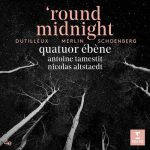
Composer: Franz Lehár, Oskar Fried, Arnold Schoenberg, Erich Wolfgang Korngold
Performer: Christine Rice, Stuart Skelton
Orchestra: BBC Symphony Orchestra
Conductor: Edward Gardner
Format: FLAC (tracks)
Label: Chandos
Release: 2021
Size: 1.05 GB
Recovery: +3%
Scan: yes
Franz Lehár:
Aus eiserner Zeit
01. No. 5, Fieber (Version for Voice & Orchestra)
Oskar Fried:
02. Verklärte Nacht, Op. 9
Arnold Schoenberg:
Verklärte Nacht, Op. 4
03. Grave – Poco più mosso
04. Moderato – Calando
05. A tempo – Poco più mosso
06. Poco allegro – Pesante – Grave
07. Pesante – Grave
08. Adagio – Meno mosso – Più mosso moderato
09. Poco adagio – Calando
10. Adagio molto tranquillo – Largo – Calando
Erich Wolfgang Korngold:
Abschiedslieder (Songs of Farewell), Op. 14
11. No. 1, Sterbelied
12. No. 2, Dies eine kann mein Sehnen nimmer fassen
13. No. 3, Mond, so gehst du wieder auf
14. No. 4, Gefaßter Abschied
An extraordinary programme, of rare intelligence and curiosity. While the heart of the programme remains Arnold Schönberg’s Verklärte Nacht (1899, here in his 1917 version for strings), it is not Edward Gardner’s conducting, for all that it is very successful by dint of its transparence and assimilation of the composer’s later course, which attracts the listener’s attention here.
The British conductor introduces Schönberg’s work, with a musical setting of the same Dehmel poem, this time by Oskar Fried. Known for having made the first recording of a Mahler symphony in 1924, as well as a number of other essential milestones in the history of music, Oskar Fried was also a composer, but this side of him has probably been forgotten somewhat… His Verklärte Nacht (Op. 9) dates from 1901, and features two voices and a large orchestra. The treatment here may be surprising – one would at times think oneself to be dealing with England, or Northern Europe, rather than a post-Wagnerian environment. The splendid initial melodic curve, supported by a transparent orchestra, introduces a stage where the voices compete in lyricism (“Zwei Menschen gehn durch kahlen, kalten Hain”). Splendid work, even if the orchestra, in its later moments, may become a little heavier, making us almost long for the airy freshness of the beginning. Christine Rice and Stuart Skelton, sometimes recorded a little distantly, are magnificent, with sensitivity and a sense of heroism.
This Chandos recording then features a magnificent cycle of four melodies by Erich Wolfgang Korngold (1920-1921), the Abschiedslieder. In the orchestral version, Korngold appears to be shouting out his love of Strauss’s Rosenkavalier. The third, “Mond, so gehst du wieder auf” takes up short, recognisable motifs from the opera’s finale (the part after the final trio), in an arrangement that accentuates its decadent spirit: but what beauty, what intelligence and what finesse in this orchestral treatment! The ever-so-slightly tired voice of Stuart Skelton undeniably contributes to the vivid emotion of this performance (far superior to the Capriccio version), even on the difficult Sterbelied. As for the Gefaßter Abschied, the fourth of the Lieder, it deploys a most engrossing orchestration, which perfectly maintains the dreamlike character of the previous Lied, along with a definitive sense of resignation.
Despite all the beauties that dot this Chandos album, the jewel in the crown remains its beginning, Fieber by Léhar, a short and extraordinarily innovative piece for voice and orchestra, in fact taken from a broader cycle by Léhar, Aus eiserner Zeit. This is the most contrasting work in the orchestra, with timbres, textures, and constantly renewed patterns. And the thing that makes it so great? Edward Gardner does not remotely acknowledge the work’s Wagnerian influences, and Skelton’s timbre is not that of a Heldentenor. In 1915, we really moved into another world, despite the memory of Berlioz remaining centre-stage… An album not to be missed under any circumstances.



